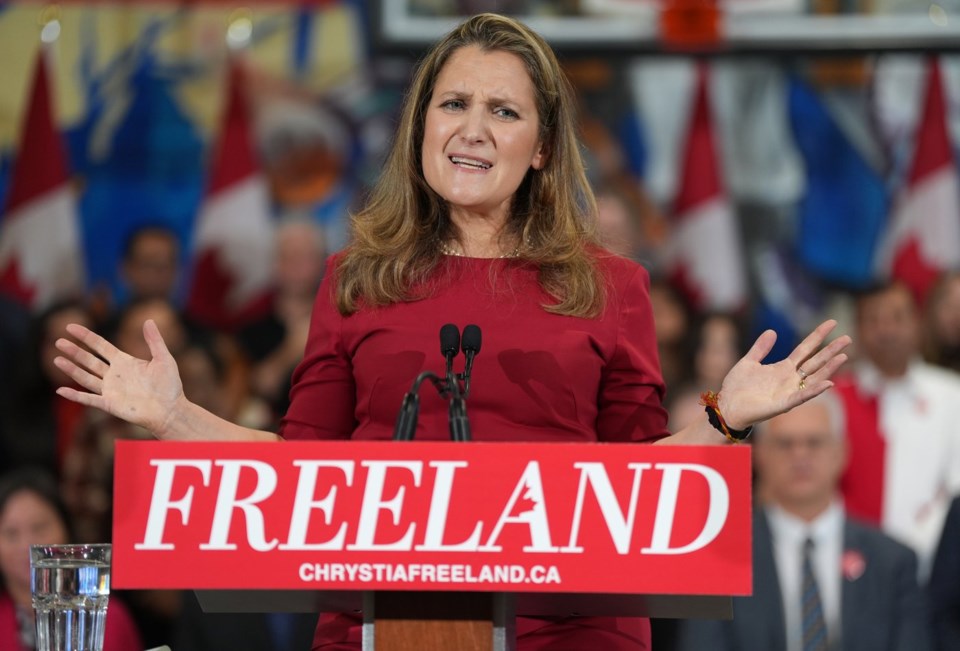OTTAWA — Liberal leadership candidate Chrystia Freeland’s pitch to export liquefied natural gas (LNG) to allies is drawing skeptical reactions from those who say her government neglected the sector over the past decade.
The former finance minister's policy statement on jobs and growth, released on Feb. 5, includes a pledge to "seize the opportunity to make Canada an energy superpower, from powering our grids with hydro to exporting liquefied natural gas to our allies."
That line is part of a package of proposals Freeland made to diversify Canada's exports in response to U.S. President Donald Trump's threat to impose steep tariffs on those exports.
But critics — even those who agree with her ideas for LNG — found it to be a tough line to swallow.
"Should I just laugh?" said Martha Hall Findlay, director of the University of Calgary's school of public policy. "It would be funny if it weren't just so frustrating."
Hall Findlay said Freeland was a central figure in the government of Prime Minister Justin Trudeau for nearly a decade, as it "did everything it could possibly do to limit our ability to export energy."
The Trudeau government shelved the Northern Gateway pipeline project in 2016. It also passed Bill C-48 in 2019, which prohibited tankers off the northwest coast of British Columbia.
Gary Mar, CEO of the Canada West Foundation, said Ottawa's track record over the past decade has "not at all been friendly to the development of natural resources" and that "nobody was speaking up for the oil and gas industry."
“They’re the right things to do," he said of Freeland's energy policy proposals. “The question is whether she has credibility to say these things."
Freeland's campaign cited the Liberal government's purchase of the Trans Mountain pipeline project, which kept it alive.
John Manley, once a heavyweight blue Liberal who now describes himself as "post-partisan," summed up his reaction to Freeland's policy proposal in two words: "Totally agree."
But Hall Findlay, a former Liberal party leadership contestant herself who later left and backed centrist Conservative party contenders, noted the absence of any mention of oil in Freeland's platform.
She suggested Freeland's strategy here is to try to "please the environmental keep-it-in-the-grounders, the anti-oil people in the Liberal party, but also trying to sound like she wants to do the right thing for the economy."
"She's trying to play both sides by saying, 'Well, we'll look at expanding the friendlier fossil fuel … but we'll avoid mentioning the one that really is the fundamental economic driver,'" Hall Findlay said. "She's trying to please everybody and I just don't think that pleases anybody.
"Canada's been spending an awful lot of time shooting itself in the foot so that a few people in Ottawa can pat themselves on the back, and unfortunately Chrystia Freeland's one of them."
But UBC politics professor Kathryn Harrison, who specializes in environment and energy policy and is a member of the B.C. Climate Solutions Council, said Freeland's platform here is consistent with the Trudeau government's track record.
"The emphasis on exporting LNG is not inconsistent with the Trudeau government's track record in that they have approved new LNG terminals during their time in government — LNG Canada, Cedar LNG," Harrison said.
The federal government also pumped hundreds of millions of dollars into LNG Canada’s complex in Kitimat, B.C.
"It's a popular line right now," Harrison added, suggesting it "plays well with voters because gas seems cleaner than oil" and it gives them a sense Canada would be doing the world a favour by helping other countries move away from more emissions-heavy fuels.
"But I think it's fraught on environmental grounds and economic grounds as well," she said, adding LNG takes a long time to receive permits and build. She also cited reports suggesting global demand for LNG may peak around 2030.
Environmental groups insist doubling down on LNG would only benefit wealthy Canadians who invest in the fossil fuel industry.
"Whoever wants to be Canada’s next prime minister must focus on solutions that will bring Canadians economic relief, and certainty without jeopardizing climate security," said Ecojustice lawyer Matt Hulse.
This report by The Canadian Press was first published Feb. 8, 2025.
Kyle Duggan, The Canadian Press



